Headline News Archive
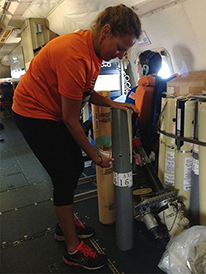 February 15, 2017 (Source: UM/RSMAS) - Last year’s devastating category-5 hurricane—Matthew—may be one of many past examples of a tropical storm fueled by massive rings of warm water that exist in the upper reaches of the Caribbean Sea.
February 15, 2017 (Source: UM/RSMAS) - Last year’s devastating category-5 hurricane—Matthew—may be one of many past examples of a tropical storm fueled by massive rings of warm water that exist in the upper reaches of the Caribbean Sea.
In a study conducted in the region two years prior to when Matthew’s trekked across the Caribbean Sea, the research team in the Upper Ocean Dynamics Laboratory at the University of Miami (UM) Rosenstiel School of Marine and Atmospheric Science (RSMAS) deployed 55 aircraft ocean instruments from the National Oceanographic Atmospheric Administration’s WP-3D aircraft. The purpose of the scientific mission was to measure ocean temperature, salinity, and currents to understand the structure of these warm-water eddies.
The science team obtained vital information about the physical characteristics within one large warm-water eddy, which likely originated from the North Brazil Current, and analyzed its potential influence on sub-surface ocean conditions during the passage of tropical cyclones.
When analyzing the data they found a barrier layer, an upper ocean feature created by the Amazon-Orinoco freshwater river outflow, that makes mixing in the upper ocean waters less efficient during wind events. This feature, and the fact that warm ocean eddies are known to assist in the intensification of hurricanes due to deep warm thermal layers, lead the researchers to theorize that the barrier layer within a warm ocean eddy may result in an even more favorable upper ocean environment for hurricane intensification.
“Our study is important because tropical cyclone intensity forecasts for several past hurricanes over the Caribbean Sea have under-predicted rapid intensification events over warm oceanic features,” said Johna Rudzin, a PhD student at the UM Rosenstiel School and lead author of the study.
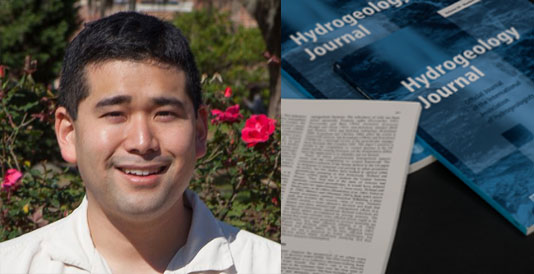 February 13, 2017 (Source: FSU) - A Florida State University researcher has drawn a link between the impact of climate change and untreated drinking water on the rate of gastrointestinal illness in children. Assistant Professor of Geography Chris Uejio has published a first-of-its-kind study, “Drinking-water treatment, climate change, and childhood gastrointestinal illness projections for northern Wisconsin (USA) communities drinking untreated groundwater,” in Hydrogeology Journal. The study explores the benefits of additional drinking water treatment compared to the risks created by climate change. “Most people may not realize this, but there are about 20 million people in the country who access drinking water that isn’t treated,” Uejio said. “These households are particularly vulnerable to rainfall events and contamination events where disease causing pathogens can get in their drinking water sources.”
February 13, 2017 (Source: FSU) - A Florida State University researcher has drawn a link between the impact of climate change and untreated drinking water on the rate of gastrointestinal illness in children. Assistant Professor of Geography Chris Uejio has published a first-of-its-kind study, “Drinking-water treatment, climate change, and childhood gastrointestinal illness projections for northern Wisconsin (USA) communities drinking untreated groundwater,” in Hydrogeology Journal. The study explores the benefits of additional drinking water treatment compared to the risks created by climate change. “Most people may not realize this, but there are about 20 million people in the country who access drinking water that isn’t treated,” Uejio said. “These households are particularly vulnerable to rainfall events and contamination events where disease causing pathogens can get in their drinking water sources.”
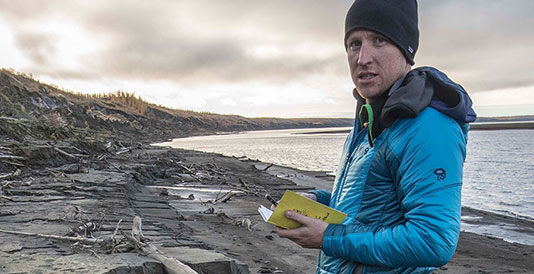 February 13, 2017 (Source: FSU) - A Florida State University researcher is delving into the complexities of exactly how permafrost thawing in the Earth’s most northern regions is cycling back into the atmosphere as carbon dioxide and further fueling climate change. Answer: It has a lot to do with tiny little bugs called microbes and little to do with sunlight.
February 13, 2017 (Source: FSU) - A Florida State University researcher is delving into the complexities of exactly how permafrost thawing in the Earth’s most northern regions is cycling back into the atmosphere as carbon dioxide and further fueling climate change. Answer: It has a lot to do with tiny little bugs called microbes and little to do with sunlight.
Assistant Professor of Earth, Ocean and Atmospheric Science Robert Spencer and a team of researchers traveled to Siberia from 2012 to 2015 to better understand how thawing permafrost affected the carbon cycle. They specifically investigated how the vast amounts of carbon stored in this permafrost transferred to the atmosphere as carbon dioxide.
In a paper published in the American Geophysical Union’s Journal of Geophysical Research-Biogeosciences, Spencer along with Aron Stubbins from the University of Georgia explain that bacteria — or microbes — were the dominant consumer of this carbon. They are gobbling up the carbon from the thawing permafrost and spitting it back out as carbon dioxide. This is in contrast to sunlight, which could also break down the carbon and turn it into carbon dioxide. In their study, researchers found sunlight converted little if any permafrost thawed carbon to carbon dioxide, whereas microbes were shown to rapidly convert permafrost carbon to carbon dioxide.
Journal of Geophysical Research: Biogeosciences Journal Article
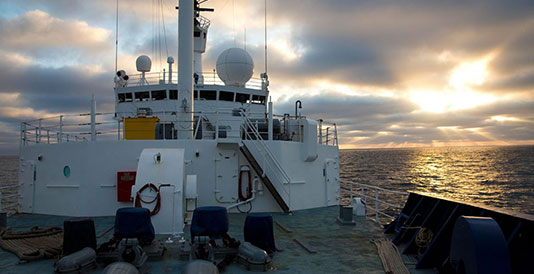 January 23, 2017 (Source: FSU) - A Florida State University researcher is taking a deep dive into the carbon cycle and investigating how carbon moves from the ocean surface to greater depths and then remains there for hundreds of years. Those findings could be critical as scientists work to better understand climate change and how much carbon the Earth’s atmosphere and oceans can store. In a paper published today in the Proceedings of the National Academy of Sciences (PNAS), FSU Assistant Professor Michael Stukel explains how carbon is transported to deeper waters and why it is happening more rapidly in certain areas of the ocean. “Algae in the surface ocean contribute half of the Earth’s photosynthesis, but most of the carbon dioxide they take up gets released back to the atmosphere when they die,” Stukel said. “The only way for this carbon to stay out of the atmosphere for a long period of time is to get it into the deep ocean. If it’s in the deep ocean, it can stay put for hundreds to 1,000 years. As the climate gets warmer, will the ocean take up more carbon dioxide or less? That’s what we ultimately need to know. But first we have to figure out how this natural process of oceanic carbon storage works.”
January 23, 2017 (Source: FSU) - A Florida State University researcher is taking a deep dive into the carbon cycle and investigating how carbon moves from the ocean surface to greater depths and then remains there for hundreds of years. Those findings could be critical as scientists work to better understand climate change and how much carbon the Earth’s atmosphere and oceans can store. In a paper published today in the Proceedings of the National Academy of Sciences (PNAS), FSU Assistant Professor Michael Stukel explains how carbon is transported to deeper waters and why it is happening more rapidly in certain areas of the ocean. “Algae in the surface ocean contribute half of the Earth’s photosynthesis, but most of the carbon dioxide they take up gets released back to the atmosphere when they die,” Stukel said. “The only way for this carbon to stay out of the atmosphere for a long period of time is to get it into the deep ocean. If it’s in the deep ocean, it can stay put for hundreds to 1,000 years. As the climate gets warmer, will the ocean take up more carbon dioxide or less? That’s what we ultimately need to know. But first we have to figure out how this natural process of oceanic carbon storage works.”
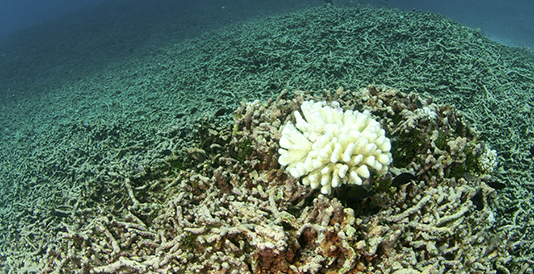 January 5, 2017 (Source: UM) - New climate model projections of the world’s coral reefs reveal which reefs will be hit first by annual coral bleaching, an event that poses the gravest threat to one of the Earth’s most important ecosystems. These high-resolution projections, based on global climate models, predict when and where annual coral bleaching will occur. The projections show that reefs in Taiwan and around the Turks and Caicos archipelago will be among the world’s first to experience annual bleaching. Other reefs, like those off the coast of Bahrain, in Chile and in French Polynesia, will be hit decades later, according to research recently published in the journal Scientific Reports. "Bleaching that takes place every year will invariably cause major changes in the ecological function of coral reef ecosystems," said study leader Ruben van Hooidonk of NOAA and the University of Miami. “Further, annual bleaching will greatly reduce the capacity of coral reefs to provide goods and services, such as fisheries and coastal protection, to human communities.”
January 5, 2017 (Source: UM) - New climate model projections of the world’s coral reefs reveal which reefs will be hit first by annual coral bleaching, an event that poses the gravest threat to one of the Earth’s most important ecosystems. These high-resolution projections, based on global climate models, predict when and where annual coral bleaching will occur. The projections show that reefs in Taiwan and around the Turks and Caicos archipelago will be among the world’s first to experience annual bleaching. Other reefs, like those off the coast of Bahrain, in Chile and in French Polynesia, will be hit decades later, according to research recently published in the journal Scientific Reports. "Bleaching that takes place every year will invariably cause major changes in the ecological function of coral reef ecosystems," said study leader Ruben van Hooidonk of NOAA and the University of Miami. “Further, annual bleaching will greatly reduce the capacity of coral reefs to provide goods and services, such as fisheries and coastal protection, to human communities.”
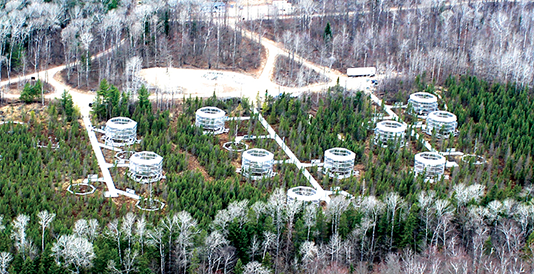 December 13, 2016 (Source: FSU) - Deep stores of carbon in northern peatlands may be safe from rising temperatures, according to a team of researchers from several U.S.-based institutions. And that is good news for now, the researchers said. Florida State University research scientist Rachel Wilson and University of Oregon graduate student Anya Hopple are the first authors on a new study published today in Nature Communications. The study details experiments suggesting that carbon stored in peat — a highly organic material found in marsh or damp regions — may not succumb to the Earth’s warming as easily as scientists thought. That means if these northern peatlands — found in the upper half of the northern hemisphere — remain flooded, a substantial amount of carbon will not be released into the atmosphere.
December 13, 2016 (Source: FSU) - Deep stores of carbon in northern peatlands may be safe from rising temperatures, according to a team of researchers from several U.S.-based institutions. And that is good news for now, the researchers said. Florida State University research scientist Rachel Wilson and University of Oregon graduate student Anya Hopple are the first authors on a new study published today in Nature Communications. The study details experiments suggesting that carbon stored in peat — a highly organic material found in marsh or damp regions — may not succumb to the Earth’s warming as easily as scientists thought. That means if these northern peatlands — found in the upper half of the northern hemisphere — remain flooded, a substantial amount of carbon will not be released into the atmosphere.
Nature Communications Journal Article
Image caption: The SPRUCE research project is spread across seven acres in a natural spruce bog in northern Minnesota. Image credit: Oak Ridge National Laboratory/U.S. Department of Energy
 November 28, 2016 - Dr. Ni-Bin Chang, FCI executive board member and professor at the University of Central Florida, traveled to Brussels, Belgium, this month to receive the Blaise Pascal Medal in Earth and Environmental Sciences from the European Academy of Sciences. The award recognizes Dr. Chang's outstanding contributions to Environmental Sustainability, Green Engineering, and Systems Analysis. Only three scholars worldwide are selected for this award each year. Details may be found at http://www.eurasc.org/medals/pb_medals_16.asp
November 28, 2016 - Dr. Ni-Bin Chang, FCI executive board member and professor at the University of Central Florida, traveled to Brussels, Belgium, this month to receive the Blaise Pascal Medal in Earth and Environmental Sciences from the European Academy of Sciences. The award recognizes Dr. Chang's outstanding contributions to Environmental Sustainability, Green Engineering, and Systems Analysis. Only three scholars worldwide are selected for this award each year. Details may be found at http://www.eurasc.org/medals/pb_medals_16.asp
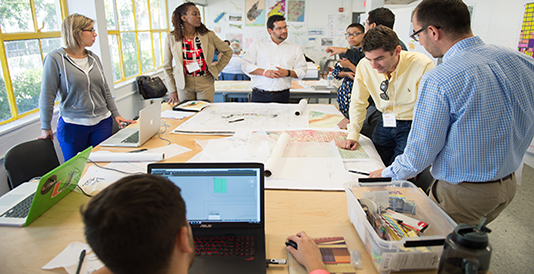 November 28, 2016 (Source: Nancy Schneider, Southeast Florida Regional Climate Change Compact) - Engaged. Dedicated. Involved. These three words describe all who participated in the Southeast Florida Regional Climate Change Compact’s Resilient Redesign III on November 14-17 at the University of Miami, School of Architecture. Professionals and experts who came from the private sector, academia, and NGOs, as well as students from University of Miami and Florida Atlantic University, all volunteered their time to collaborate with public sector practitioners on addressing the challenges in three areas of Southeast Florida: Arch Creek (Miami-Dade County), Shorecrest (City of Miami) and Lower Matecumbe Key (Village of Islamorada).
November 28, 2016 (Source: Nancy Schneider, Southeast Florida Regional Climate Change Compact) - Engaged. Dedicated. Involved. These three words describe all who participated in the Southeast Florida Regional Climate Change Compact’s Resilient Redesign III on November 14-17 at the University of Miami, School of Architecture. Professionals and experts who came from the private sector, academia, and NGOs, as well as students from University of Miami and Florida Atlantic University, all volunteered their time to collaborate with public sector practitioners on addressing the challenges in three areas of Southeast Florida: Arch Creek (Miami-Dade County), Shorecrest (City of Miami) and Lower Matecumbe Key (Village of Islamorada).
Resilient Redesign began in 2014 when the Dutch Consulate approached the Southeast Florida Regional Climate Change Compact to hold a design charrette addressing the challenges in Southeast Florida related to flooding caused by sea level rise, high(er) tides, and extreme rain events. In the Netherlands, a country where 26% of land area is below sea level and 50% is three feet elevation or less, they have perfected “living with water” over the centuries. This four-day event began with participants donning their flip flops or rubber boots and wading through the brackish water on the tour of the affected areas, which coincided with a King Tide causing the streets to look more like canals. Due to high levels of water on many streets, city services were interrupted, residents were cut off from driving out of their driveways or from taking their usual routes. The teams reunited on the second day to begin discussions on what could be done through design to address flooding, overstressed infrastructure, improve residents’ quality of life, and improve economic opportunities. The teams worked late into the nights, developing ideas with input from experts in hydrology, land use law, infrastructure and natural systems.
In addition to living with water, all teams had a second theme: integrating nature and natural systems into the designs. Unfortunately in the past, nature was considered something to be bulldozed over and forced to disappear with development in Florida. Much of this is what is causing the problems today with developed tracts in what was once wetlands or riverbeds.To allow for greater resiliency over time, charrette leader Sonia Chao, director of the university’s Center for Urban and Community Design, advised designs for the short-term, mid-term and long-term. This helps ensure that short-term solutions don’t get in the way of the mid-term, and similarly for the mid-term considerations to not inhibit the long-term goals. By incorporating legal options into the design choices, short-term considerations become more feasible and creating the opportunity for long-term natural systems solutions.
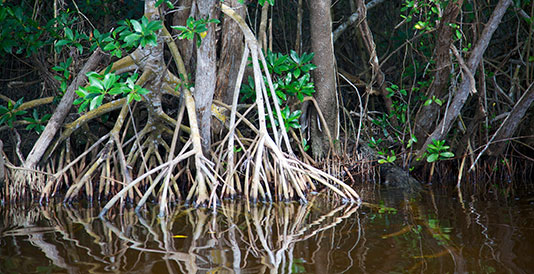 November 14, 2016 (Source: FIU) - When it comes to storing carbon, scientists have put a price tag on the value of mangroves in Everglades National Park and it’s in the billions. Based on a scientific cost estimate, the stored carbon is worth between $2 billion and $3.4 billion, the researchers found. It is a relatively small price when considering the cost to society if the carbon currently stored in these mangroves were ever released into the atmosphere, according to the researchers at FIU who co-authored the study.
November 14, 2016 (Source: FIU) - When it comes to storing carbon, scientists have put a price tag on the value of mangroves in Everglades National Park and it’s in the billions. Based on a scientific cost estimate, the stored carbon is worth between $2 billion and $3.4 billion, the researchers found. It is a relatively small price when considering the cost to society if the carbon currently stored in these mangroves were ever released into the atmosphere, according to the researchers at FIU who co-authored the study.
"Although the Everglades National Park is a protected national treasure, the National Parks Service doesn’t have much control over freshwater flowing into the park," said Mahadev Bhat, co-author of the study and professor in FIU's Department of Earth and Environment. “If there isn’t enough freshwater flowing through the Everglades, we may eventually lose some of the mangroves. And once you let stored carbon out, that same carbon can lead to increased global warming and cost society a lot more.”
In addition to removing excess carbon dioxide from the air, mangroves provide a variety of other benefits, including flood control, storm protection and maintaining water quality. The billion-dollar price tag reflects the cost to preserve the park’s mangroves and their ability to hold organic carbon intact by restoring freshwater flow to the areas that need it the most.
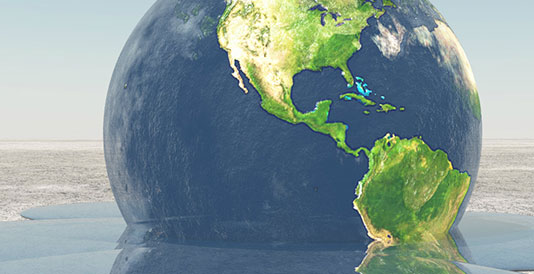 November 10, 2016 (Source: UF) - Global climate change has already impacted every aspect of life on Earth, from genes to entire ecosystems, according to a new University of Florida study. The paper appears today in the journal Science.
November 10, 2016 (Source: UF) - Global climate change has already impacted every aspect of life on Earth, from genes to entire ecosystems, according to a new University of Florida study. The paper appears today in the journal Science.
"We now have evidence that, with only a ~1 degree Celsius of warming globally, major impacts are already being felt in natural systems," said study lead author Brett Scheffers, an assistant professor in the department of wildlife, ecology and conservation in UF’s Institute of Food and Agricultural Sciences. "Genes are changing, species’ physiology and physical features such as body size are changing, species are shifting their ranges and we see clear signs of entire ecosystems under stress, all in response to changes in climate on land and in the ocean."
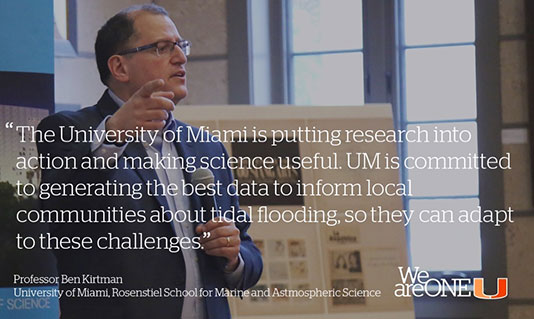 November 2, 2016 (Source: UM/RSMAS) - Severe weather events like Superstorm Sandy are revealing the vulnerability of New York City and other coastal communities, particularly as sea levels continue to rise. In his lab at the University of Miami Rosenstiel School, Ben Kirtman is using one of the world’s largest supercomputers to more accurately predict the risk of severe flooding—in the upcoming weeks and decades. In this ’Cane Talk, Professor Kirtman describes what his research means for cities across the globe.
November 2, 2016 (Source: UM/RSMAS) - Severe weather events like Superstorm Sandy are revealing the vulnerability of New York City and other coastal communities, particularly as sea levels continue to rise. In his lab at the University of Miami Rosenstiel School, Ben Kirtman is using one of the world’s largest supercomputers to more accurately predict the risk of severe flooding—in the upcoming weeks and decades. In this ’Cane Talk, Professor Kirtman describes what his research means for cities across the globe.
Ben Kirtman is a professor of atmospheric sciences at the University of Miami’s Rosenstiel School of Marine and Atmospheric Science. He leads UM’s Cooperative Institute for Marine and Atmospheric Studies and the Center for Computational Science’s Climate and Environmental Hazards Program. Known internationally for using complex computer models to bring unprecedented detail to climate change measurement, Professor Kirtman also serves as an advisor to the United Nations and other multinational organizations.
Click here to watch Ben Kirtman's recent CaneTalk
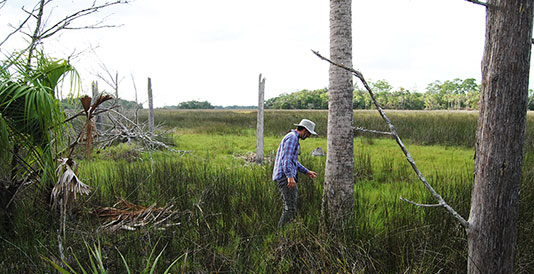 November 2, 2016 (Source: Yale Environment 360) - A steady increase in sea levels is pushing saltwater into U.S. wetlands, killing trees from Florida to as far north as New Jersey. But with sea level projected to rise by as much as six feet this century, the destruction of coastal forests is expected to become a worsening problem worldwide.
November 2, 2016 (Source: Yale Environment 360) - A steady increase in sea levels is pushing saltwater into U.S. wetlands, killing trees from Florida to as far north as New Jersey. But with sea level projected to rise by as much as six feet this century, the destruction of coastal forests is expected to become a worsening problem worldwide.
A new Yale Environment 360 article features research conducted by University of Florida watershed ecologist David Kaplan and Ph.D. candidate Katie Glodzik in the Withlacoochee Gulf Preserve, on the Big Bend coast of northwestern Florida.
Read Full Yale Environment 360 News Article
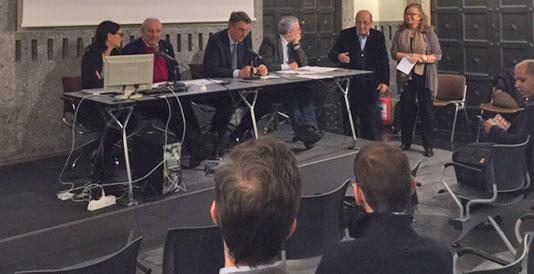 November 1, 2016 - Following the First UNESCO Field Workshop in New York and Miami, and after six months of international coordinated efforts, the organizing parties, The UNESCO CHAIR in Sustainable Urban Quality and Culture, notably in Africa; the Universita’ La Sapienza of Rome, Italy; and the Consortium from Hydro-Generated Urbanism, University of Florida US convened in Rome.
November 1, 2016 - Following the First UNESCO Field Workshop in New York and Miami, and after six months of international coordinated efforts, the organizing parties, The UNESCO CHAIR in Sustainable Urban Quality and Culture, notably in Africa; the Universita’ La Sapienza of Rome, Italy; and the Consortium from Hydro-Generated Urbanism, University of Florida US convened in Rome.
 November 1, 2016 - Dr. Jennifer Jurado presented an invited Keynote Talk at the 2016 China-US Joint Symposium entitled, “International Nexus of Food, Energy, Water and Soil” held in Yixing, Jiangsu Province, China on October 26-29. The title of her Keynote address was “Building Community Resilience through Integrated Natural Resource and Urban Planning in Broward County, Florida” and included the FCI-Compact partnership as an example of how communities and academia are working together. Jennifer is one of the Founding Steering Committee Members of Southeast Florida Climate Compact, directs the Broward County Environmental Planning and Community Resilience Division, and was among 12 people the White House identified as "Champions of Change" for preparing their communities for the consequences of climate change. While at the event in China, Jennifer met with Dr. James Jones, the Director of the Florida Climate Institute, who is now serving a 2-year term as the Engineering Director for NSF’s INFEWS (Food, Energy, Water Nexus) Program.
November 1, 2016 - Dr. Jennifer Jurado presented an invited Keynote Talk at the 2016 China-US Joint Symposium entitled, “International Nexus of Food, Energy, Water and Soil” held in Yixing, Jiangsu Province, China on October 26-29. The title of her Keynote address was “Building Community Resilience through Integrated Natural Resource and Urban Planning in Broward County, Florida” and included the FCI-Compact partnership as an example of how communities and academia are working together. Jennifer is one of the Founding Steering Committee Members of Southeast Florida Climate Compact, directs the Broward County Environmental Planning and Community Resilience Division, and was among 12 people the White House identified as "Champions of Change" for preparing their communities for the consequences of climate change. While at the event in China, Jennifer met with Dr. James Jones, the Director of the Florida Climate Institute, who is now serving a 2-year term as the Engineering Director for NSF’s INFEWS (Food, Energy, Water Nexus) Program.
This symposium was sponsored by the US National Science Foundation and the National Science Foundation of China, and was hosted by Nanjing University. One of the goals of that workshop was to explore ways to increase collaboration between scientists and engineers in China and the USA.
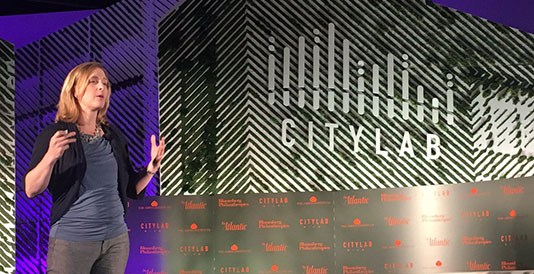 October 31, 2016 - Dr. Andrea Dutton (UF) spoke to an audience of mayors and city innovators at the CityLab 2016 summit in Miami on October 24th about considering the longer term future of their cities when planning for adaptations to sea-level rise. CityLab is a venue for Mayors of cities from around the globe to come together to discuss innovative solutions for cities, sponsored by Bloomberg Philanthropies, The Atlantic, and The Aspen Institute. This year’s events featured mayors from Washington D.C., Detroit, Miami, Mexico City (Mexico), Bogota (Colombia) among others. Sustainability and adaptation in the context of ongoing climate change and sea-level rise were hot topics of discussion during the two-day event. A video of Dr. Dutton's talk can be viewed here: https://youtu.be/wbTzdQuSoHM
October 31, 2016 - Dr. Andrea Dutton (UF) spoke to an audience of mayors and city innovators at the CityLab 2016 summit in Miami on October 24th about considering the longer term future of their cities when planning for adaptations to sea-level rise. CityLab is a venue for Mayors of cities from around the globe to come together to discuss innovative solutions for cities, sponsored by Bloomberg Philanthropies, The Atlantic, and The Aspen Institute. This year’s events featured mayors from Washington D.C., Detroit, Miami, Mexico City (Mexico), Bogota (Colombia) among others. Sustainability and adaptation in the context of ongoing climate change and sea-level rise were hot topics of discussion during the two-day event. A video of Dr. Dutton's talk can be viewed here: https://youtu.be/wbTzdQuSoHM
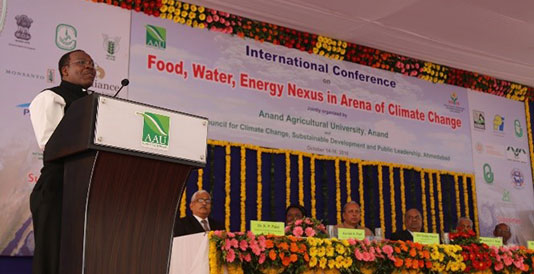 October 31, 2016 - Dr. O.S. Mbuya was recently invited to India as one of the keynote speakers at the International Conference on Food, Water, Energy Nexus in Arena of Climate Change representing Florida A&M University (FAMU) and the Florida Climate Institute (FCI). Prior to the meeting, he visited the State Government of Gujarat where he met with the high ranking State officials, including the Honorable Chief Secretary of Gujarat (Dr. J.N. Singh), the Honorable Minister of Agriculture of Gujarat (Shri Chimanbhai Saparia). Accompanying Dr. Mbuya to the State Government headquarters were the Vice Chancellor of Anand Agricultural University (Dr. N.C. Patel), the Vice Chancellor of Junagadh Agricultural University (Dr. A.R. Pathak) and the Executive Chairman of NCCSD (Dr. Kirit Shelat. Topics discussed under the umbrella of FCI included Climate Change, ClimateSmart Agriculture and International collaborative research.
October 31, 2016 - Dr. O.S. Mbuya was recently invited to India as one of the keynote speakers at the International Conference on Food, Water, Energy Nexus in Arena of Climate Change representing Florida A&M University (FAMU) and the Florida Climate Institute (FCI). Prior to the meeting, he visited the State Government of Gujarat where he met with the high ranking State officials, including the Honorable Chief Secretary of Gujarat (Dr. J.N. Singh), the Honorable Minister of Agriculture of Gujarat (Shri Chimanbhai Saparia). Accompanying Dr. Mbuya to the State Government headquarters were the Vice Chancellor of Anand Agricultural University (Dr. N.C. Patel), the Vice Chancellor of Junagadh Agricultural University (Dr. A.R. Pathak) and the Executive Chairman of NCCSD (Dr. Kirit Shelat. Topics discussed under the umbrella of FCI included Climate Change, ClimateSmart Agriculture and International collaborative research.
The Honorable Minister of Agriculture of the Government of India (Shri Parshottam Rupala) and the Principal Secretary of Ministry of Agriculture of the Government of India (Dr. Sanjay Prasad) attended the International Conference on Food, Water, Energy Nexus in Arena of Climate Change at Anand Agricultural University, and they both echoed the significance of partnership between FAMU/FCI and the Government of India. Currently there are pending MoUs between FAMU and Anand Agricultural University, Junagadh Agricultural University, University of Mumbai and India Council of Agricultural Research (ICAR). ICAR is a federal agency which oversees all 73 agricultural universities in India. The Government of the State of Gujarat and the Government of India are very receptive and supportive of the FAMU and FCI-India Initiative.
Next month, Dr. Mbuya will travel to Marakkesh, Morocco to represent FAMU and FCI at the United Nations Forum for Climate Change Convention (UNFCCC) and COP22. Last year, he presented an FCI poster at the UNFCCC/COP21 in Paris where he highlighted the scientific milestones of FCI. Institutions of the FCI consortium are hereby requested to suggest and/or submit any material they would like to be presented at the COP22 in Morocco.
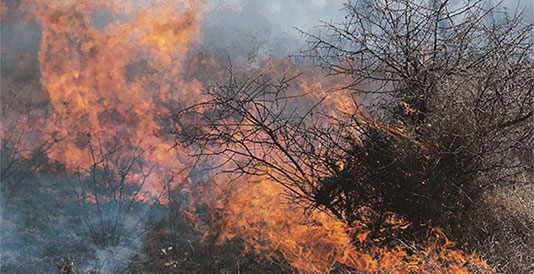 October 28, 2016 - A team led by FSU assistant professor of geography Chris Uejio and state climatologist David Zierden has received a $1.07 million grant from the Centers for Disease Control and Prevention to help county health departments across Florida adapt to problems created by changing environmental factors such as climate change. The team will work with individual Florida counties to assess potential environmental problems that would affect public health. They will also help health officials develop action plans to combat these issues. Other members of the FL BRACE team from Florida State include This email address is being protected from spambots. You need JavaScript enabled to view it. and Danny Brouillette from the Center for Ocean and Atmospheric Studies, and assistant professor of urban and regional planning Tisha Holmes.
October 28, 2016 - A team led by FSU assistant professor of geography Chris Uejio and state climatologist David Zierden has received a $1.07 million grant from the Centers for Disease Control and Prevention to help county health departments across Florida adapt to problems created by changing environmental factors such as climate change. The team will work with individual Florida counties to assess potential environmental problems that would affect public health. They will also help health officials develop action plans to combat these issues. Other members of the FL BRACE team from Florida State include This email address is being protected from spambots. You need JavaScript enabled to view it. and Danny Brouillette from the Center for Ocean and Atmospheric Studies, and assistant professor of urban and regional planning Tisha Holmes.
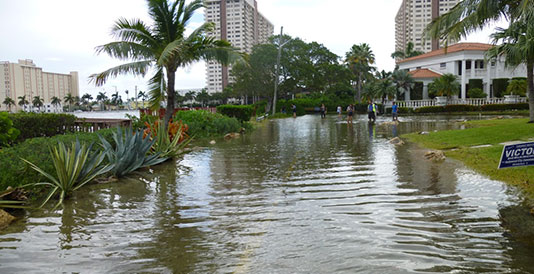 October 31, 2016 - This past month, the Sea Level Solutions Center (SLSC), the Office of University Sustainability and the School of Communication & Journalism at Florida International University teamed up with Eyes on the Rise, the Miami-Dade County Office of Resilience, and the CLEO Institute, to collect data on King tides and flooding in the community. This year’s Sea Level Solutions Day saw a large group of students, teachers, citizens and community leaders coming out to get involved with local flood awareness efforts and citizen science reporting. After meeting at Vizcaya’s Village & Garage to collect their citizen science kits, teams were out measuring flooding at a range of locations around Southeast Florida – from Biscayne Bay to Hollywood – with the majority of reports showing flood levels between 5-12 inches. Their measurements have contributed valuable data to the Eyes On The Rise app, which is helping people to visualize future flooding scenarios under sea level rise. To find out how you can get involved with future flood reporting events and other sea level activities, just email This email address is being protected from spambots. You need JavaScript enabled to view it.!
October 31, 2016 - This past month, the Sea Level Solutions Center (SLSC), the Office of University Sustainability and the School of Communication & Journalism at Florida International University teamed up with Eyes on the Rise, the Miami-Dade County Office of Resilience, and the CLEO Institute, to collect data on King tides and flooding in the community. This year’s Sea Level Solutions Day saw a large group of students, teachers, citizens and community leaders coming out to get involved with local flood awareness efforts and citizen science reporting. After meeting at Vizcaya’s Village & Garage to collect their citizen science kits, teams were out measuring flooding at a range of locations around Southeast Florida – from Biscayne Bay to Hollywood – with the majority of reports showing flood levels between 5-12 inches. Their measurements have contributed valuable data to the Eyes On The Rise app, which is helping people to visualize future flooding scenarios under sea level rise. To find out how you can get involved with future flood reporting events and other sea level activities, just email This email address is being protected from spambots. You need JavaScript enabled to view it.!
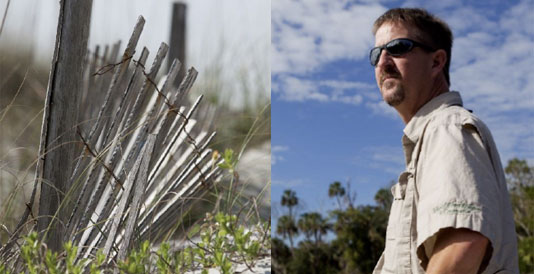 October 28, 2016 (By Hannah O. Brown, UF/SNRE) - In less than a year, Russell Anderson plans to be working hands-on, surveying coastal planning projects worldwide. Anderson is a second-year master’s student studying sustainable development, and he is one of a number of students who have decided to pursue UF’s Concentration in Climate Science, an interdisciplinary concentration through the School of Natural Resources and Environment and in collaboration with the Florida Climate Institute. “Internationally, everybody is really trying to plan for the population of what will happen by 2050, with 70 percent of people being in low-lying urban areas,” Anderson said. “That’s over 7 billion people, coast-to-coastline, all stuck in urban centers.” Through taking classes within the concentration, Anderson has gained professional skills and insight into climate change issues on a global scale. “It really made sense based on my professional interest long term, and it was also a chance to really get educated about [climate change effects] that we are already starting to see happening in certain areas,” Anderson said.
October 28, 2016 (By Hannah O. Brown, UF/SNRE) - In less than a year, Russell Anderson plans to be working hands-on, surveying coastal planning projects worldwide. Anderson is a second-year master’s student studying sustainable development, and he is one of a number of students who have decided to pursue UF’s Concentration in Climate Science, an interdisciplinary concentration through the School of Natural Resources and Environment and in collaboration with the Florida Climate Institute. “Internationally, everybody is really trying to plan for the population of what will happen by 2050, with 70 percent of people being in low-lying urban areas,” Anderson said. “That’s over 7 billion people, coast-to-coastline, all stuck in urban centers.” Through taking classes within the concentration, Anderson has gained professional skills and insight into climate change issues on a global scale. “It really made sense based on my professional interest long term, and it was also a chance to really get educated about [climate change effects] that we are already starting to see happening in certain areas,” Anderson said.
The idea for the UF Climate Science Concentration was first conceived by faculty who were considering the notion of establishing a certificate program, geared toward professionals. With the basic structure of the concentration already in motion, SNRE Director Tom Frazer suggested FCI and SNRE switch their focus, in the short term, to enhancing the skills of graduate students instead. “I suggested that there was actually a more immediate need to offer those courses to our students rather than the place-based professionals,” Frazer said. “And a concentration, at the time, was a more effective way to start to put a focus on climate in the curriculum.”
The FCI faculty advisory committee, which is made up of professors from biology, geology, SNRE, forestry, Latin American studies and geography, approved the first list of courses for the concentration in the fall of 2014. The concentration is divided into four categories of study: principles of climate science, system-specific climate science, quantitative methods and human dimensions. Students pursuing the concentration are required to take at least one course from each category, for a total of 12 credit hours.
Carolyn Cox, UF coordinator for the Florida Climate Institute, said the human-dimensions component of the program is just as important as the scientific training. “There’s so many people who work in different disciplines who use climate science, and there is always this need for how to talk to people about it,” she said. While it has become increasingly important for researchers to effectively communicate about their findings, Cox believes there is still resistance from many scientists who prefer to focus simply on the science. However, Cox said that the problem with this reluctance is that some of these scientists lack the skillset to see through the tactics that others use to discredit their research. “Even scientists, people that are very pro-climate science and advocate climate science, they still fall into that trap of calling it a debate,” Cox said. “It’s not a debate. A debate is when there are actually two sides to a story. There’s not really two sides here. There’s a manufactured side and a real side.” Cox hopes that the Climate Science Concentration can help teach the skills needed to accurately represent climate-related research even when confronted with skepticism and denial. “People need to know how not to fall into those traps,” she said, “how to stay dignified, not fall into the he-said-she-said garbage and not embarrass themselves.”
For Frazer, it’s particularly important to provide the opportunity for SNRE students to focus on climate science through a concentration, because it gives those students a chance to specialize, making their skills more marketable in the professional world. “There is a real risk in getting an interdisciplinary degree where the emphasis is simply on breadth,” he said, “but one of the ways that you deal with depth and the ability to convince a potential employer, whether it’s in an academic setting, a government setting or some other work-related environment, is that you actually have a focus area.” Frazer said having concentrations is one way for SNRE students to showcase the particular skills they acquire while pursuing their degree. “It provides depth,” he said. “Recognizable, identifiable, demonstrable depth in a subject area that complements the broader interdisciplinary degree.” Future plans for the concentration include the possibility of offering a travel stipend to students who are interested in attending climate-science conferences, workshops and giving presentations. Cox said she is still hoping to expand the program to include a certificate, allowing professionals as well as students to become more aware of the science and better able to communicate it.












